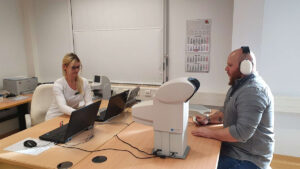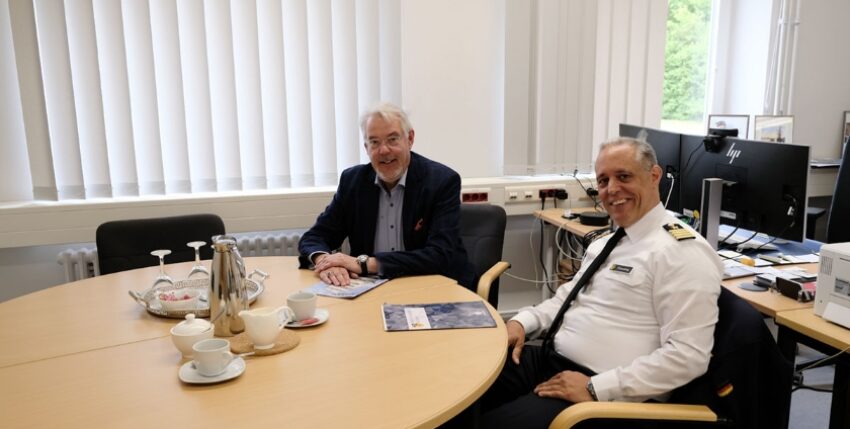What is the situation regarding the recruitment of young people for the navy? An interview update with the head of the Bundeswehr's career centre in Wilhelmshaven
Captain Christian Clausing has one of those jobs that makes you think of "Mission Impossible". Nevertheless, the 52-year-old, with whom the marine forum spoke for the first time last year, has retained his optimism. What has changed in recent months, especially in terms of bureaucracy? He laughs: "A little," he says, pointing to a small gap between his thumb and index finger. And there is also reason for optimism, as the number of applicants is developing well. What is he responsible for? As head of the careers centre in Wilhelmshaven, he reports to the Federal Office of Bundeswehr Personnel Management. directly subordinate.

A lot is required of the 15 departments of the Bundeswehr's recruitment organisation. Of these, only eight are currently designed for recruitment, as they include not only personnel recruitment, but also the Vocational Training Service and the competences of the former District Armed Forces Replacement Offices that remained after the suspension of compulsory military service. In other words, the military replacement system, but we will come to that later. Firstly, Clausing outlines the framework of what is expected of him and begins with a gloomy forecast: "In 2025, we will have the largest number of leavers ever since the suspension of compulsory military service: 24,000 people will leave the armed forces. And not only do we have to regenerate them, we also have to increase the number. Starting in 2025, there will be 5,000 more volunteers doing military service every year, and by 2032 we will have 40,000 more." With around 182,000 active soldiers, the Bundeswehr is far behind the target of 203,000 set for 2031.
Over 20,000 unfilled posts should make Clausing despair, but he doesn't. "Firstly, it will be easier with the retirements after 2026 and we are also seeing a positive trend in the number of applicants. This is helping to secure jobs, but the worsening economic situation is also making many young people think about the Bundeswehr as an alternative." He considers the debate about ageing to be pointless: "Anyone who can do something and is fit should be allowed to serve." However, the Federal Office of Personnel Management has also made his job easier as a result of a court judgement: since last year, the so-called potential assessments for active soldiers no longer have to be carried out. These examinations, known in the jargon as PF, which soldiers had to undergo when applying to become a professional soldier or for an officer's career, have been suspended. This has freed up space for the examiners and the psychological service.
He holds up figures to prove this: the deployment rate in 2025 is a quarter higher than last year, and an increase of over 4,000 personnel allows him to cautiously predict that we could be looking at 25,000 deployments by the end of the year. He speaks of a good level, but: "The truth is also that if you deduce from NATO's requirements that there should ultimately be 260,000 active personnel and 200,000 reservists, these political goals are difficult to achieve with the current procedures. Then I find it difficult to imagine how we can achieve this without compulsory contributions." With this use of language, he is referring to both compulsory military service and compulsory conscription. The monitoring of military service with conscription would be a basic prerequisite for mobilisation. But the entire complex system of registration, monitoring and mustering is not only suspended and dormant, it is practically dead. According to Clausing, the data records have been frozen since 2011 and it is easy to imagine what this means for the timeliness of this data. "Germany has to rebuild the entire system again, there can't really be any talk of a revival." And Clausing goes one better: "How big should we become and, above all, how quickly?" It becomes impressively clear what an overwhelming task the Federal Office for Personnel Management has - and it can't do it from Cologne alone, the office is recruiting nationwide.

And what about the navy? Christian Clausing presents a list of around thirty events - for naval planning alone. It starts with four events entitled "Get a taste of the sea", which are advertised in North Rhine-Westphalia and extend to Rhineland-Palatinate, Saxony and Thuringia. However, when he sets out with his personnel to promote the Bundeswehr as a whole, he has to overcome a few blockades in the navy: "We have more planning, but the navy doesn't benefit from this as much as the army and air force." The reason has always been that the navy is on the coast, but the demand cannot be met from there alone, so people have to be prepared to move to the coast. "That may still work for North Rhine-Westphalia, as you can see from the figures that the career centre in Düsseldorf provides for the navy. But the numbers from Berlin, Thuringia, Bavaria or Rhineland-Palatinate are sparse. What's more, the distance from NRW to Wilhelmshaven can still be marketed, but it's more difficult from Parow. "The trend in recent years to choose a profession close to home beats many other good arguments," says Clausing.
And how is the cooperation with the navy? Captain Clausing takes a deep breath. For a long time, he was a member of Operational Flotilla 2, which is based just two blocks away on the Heppenser Groden property. He was commander of the frigate KARLSRUHEAs a former personnel officer, he knows the hardships of his navy. He is well connected and doesn't like to denounce, but the truth sometimes hurts:
"In contrast to the army and air force, we are much more tied to specialisms and professions." He considers some of these demands to be excessive. He uses the example of the aptitude test to explain his reasons:
"Why would an applicant want to become a non-commissioned officer without a licence if he is also suitable for a non-commissioned officer with a licence?"
He also sees room for improvement in terms of bureaucracy. Does he mean the naval command? He does not answer the question and lists how he deals with the capacities for basic training.
Like an unplanned rescue. Christian Clausing not only heads the Marine Competence Centre, he also lives it.
Fighting for Wilhelmshaven as the location of a strong centre years ago has paid off. Clausing emphasises the good cooperation with the centres in Hanover and Düsseldorf. Formerly launched as a pilot project and only half-heartedly, its success today proves it right.
When asked about the personnel situation in the navy, he admits that he knows the figures, but that it is up to the naval command to assess them. The fact that these are not intended for the public is only partly due to the fact that conclusions can be drawn about operational readiness. Personnel situations are education is struggling. "We have an east-west imbalance," he points out with reference to the schools and, in addition, the seasonal wave - meaning the timing of school graduations and trainees taking time off - is not optimally utilised. Schools would like to have even capacity utilisation, but this is not possible. A phenomenon that has been well known for years and never seems to change.
Looking at the figures, it is noticeable that capacity has been created in Wilhelmshaven: Well, the buildings in the 4th entrance, as they say in the navy, were originally built for crews waiting to be taken on board and undergoing training. With the suspension of the multi-crew model in 2024, the personnel shortage was taken into account. A side effect of this is the availability of much sought-after accommodation capacity.
Like an unplanned rescue. Christian Clausing not only heads the Marine Competence Centre, he also lives it. Fighting for Wilhelmshaven as the location of a strong centre years ago has paid off. Clausing emphasises the good cooperation with the centres in Hanover and Düsseldorf. Formerly started as a pilot project and only half-heartedly, its success today proves it right.
When asked about the personnel situation in the navy, he admits that he knows the figures, but that it is up to the naval command to assess them. The fact that these are not intended for the public is only partly due to the fact that conclusions can be drawn about operational readiness. Personnel situations are complex and can only be correctly interpreted in depth by experts.
But this much can be said: Across all ranks and grades, the Navy has a manning level of around 80 per cent. For officers and petty officers - i.e. with the proportion of professional soldiers - the occupation rate is almost 90 per cent. But for non-commissioned officers and enlisted personnel, this is significantly lower in some cases. The deficits in the various assignments fluctuate greatly. In particular, there is still a clear need for seafaring "specialists".
So the situation is unsavoury, can he offer any hope? "We are currently at a potential utilisation rate of 84.6 per cent of applicants," says Clausing optimistically. "I won't send anyone suitable away without an offer!"
Holger Schlüter







